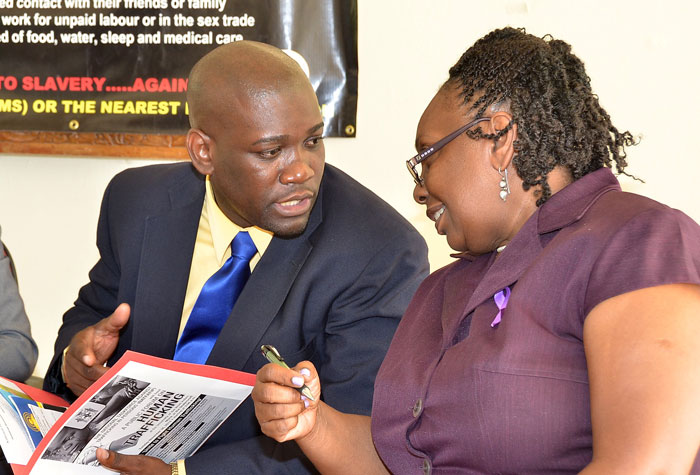Jamaicans Urged to Report Cases of Human Trafficking
By: , November 27, 2013The Key Point:
The Facts
- The Registrar has now forged a relationship with the JCF’s Anti-Trafficking in Persons Unit.
- The Government of Jamaica has employed several strategies to fight the scourge.
The Full Story
Registrar at the Office of the Children’s Registry (OCR), Greig Smith, has joined the call for Jamaicans to break the silence and report known or suspected incidences of human trafficking, especially those cases involving children.
Addressing a public forum on human trafficking at the University of the West Indies (UWI) Mona campus, on November 26, Mr. Smith informed that in 2012, the OCR received five reports of children, who were trafficked in Jamaica.
“So far, this year (in) February, we collected one report of a child being trafficked and between September and October, two female children, 11 and 12 year-olds, were reported to us,” he said.
The Registrar said the OCR takes the matter seriously and has now forged a relationship with the Jamaica Constabulary Force’s (JCF) Anti-Trafficking in Persons Unit, where once the OCR receives a report, whether confirmed or suspected, it is referred to the unit for action.
Trafficking in Persons (TIP), also referred to as modern day slavery, is an international organised crime against humanity that affects virtually every country.
Head of the JCF Anti-Trafficking in Persons Unit, Deputy Superintendent of Police (DSP), Carl Berry, who also addressed the forum, informed that a large percentage of victims are children.
“As it relates to victims, the conditions of economic hardships and lack of opportunities in the source countries have served to create an endless pool of potential recruits amongst young females and increasingly, boys and girls,” he said.
DSP Berry further noted that a significant feature of human trafficking is the promise of jobs, opportunities for school and a better life, usually in a foreign country. “It should be made clear that the victims are targeted for their capacity to provide sexual gratification, forced labour, servitude, organ removal, sex tourism, prostitution, and pornography,” he said.
He also informed that transnational organised criminals have increased their participation in the illicit trade in humans for the main purpose of enriching themselves as well as to continue their nefarious activities.
“Of equal importance, is the fact that criminals have begun to use modern technological tools in order to facilitate their illicit activities and evade law enforcement,” DSP Berry said, noting that traffickers often recruit their victims through social media platforms such as Facebook, Twitter and Linked10, in addition to word of mouth or referrals.
The Government of Jamaica has employed several strategies to fight the scourge and is consistently making strides in bringing perpetrators to justice.
Among the strategies is the establishment of the National Task Force Against Trafficking in Persons (NATFATIP) as a multi-agency approach to enhance national capacity to develop and implement Jamaica’s legislative, institutional and operational framework to eliminate TIP and to coordinate and implement the National Plan of Action to Combat Trafficking in Persons 2012 to 2015.
The Trafficking in Persons (Prevention, Suppression and Punishment) Act was enacted; the first National Plan of Action was developed and implemented; and the Government commissioned a study on the scope and nature of human trafficking in Jamaica.
In 2012, Jamaica approved the National Plan of Action to Combat Trafficking in Persons, which adopts the guiding principles of the Global Plan of Action of the United Nations.
In addition, 50 persons from agencies such as the Passport, Immigration and Citizenship Agency (PICA); Centre for Investigation of Sexual Offences and Child Abuse (CISOCA); JCF; Office of the Children’s Advocate; and the Ministries of National Security, Justice, and Labour and Social Security, participated in the United States of America (USA) Department of Homeland Security training on TIP/Child Exploitation/Forced Child Labour, which focused on sharing best practices related to investigation, prosecution and victim identification and assistance.
Further, between 2012 and 2013, 255 raids were conducted, six cases detected and 39 victims rescued. Three TIP cases were suspected with 23 victims being rescued. Seven TIP investigations were launched, and four arrests were made up to March 2013.
Earlier this year, Jamaica was upgraded from the United States State Department’s Tier 2 Watch List to Tier 2, which reflects the Jamaican Government’s significant efforts to fight human trafficking.
In addition, the Government increased, during 2013, collaboration with Jamaica’s hotel and tourism industry. Efforts were also increased to address the demand for commercial sex acts by conducting high profile raids on hotels and nightclubs, the document further stated.
Additionally, the legislative framework was strengthened through amendments to the Trafficking in Persons Act. Also, the JCF’s Anti-Trafficking in Persons Unit received $3,267,458.35 in equipment and vehicles to aid in investigations and outreach.
Organised by NATFATIP, the forum was held under the theme: ‘Unite to Fight Human Trafficking’.

